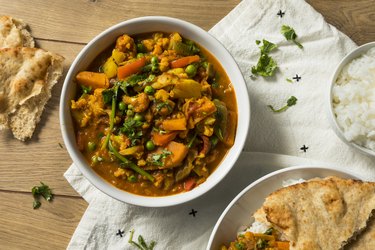
According to the Academy of Nutrition and Dietetics, religious beliefs, such as Jainism, contribute to vegetarianism. Jainism is an Indian religion that has existed since ancient times.
At the heart of the Jain religion is the belief that in order to save one's soul, one must protect other souls, a principle known as "ahimsa," or nonviolence.
Video of the Day
Video of the Day
Read more: 5 Reasons People Become Vegetarian
Nonviolence and the Jain Diet
Since Jains believe strongly in the principle of nonviolence toward all living beings, their diet is vegetarian. Unlike many vegetarians, however, Jains expand their definition of "living beings" to include bacteria and other microorganisms. Additionally, it is not acceptable to merely avoid foods derived from animal sources when following a Jain diet. The harvesting of some foods harms living beings, and a Jain must not consume these foods.
According to Arihant.us, a Jain website, Jains may not eat after sunset as it could "cause the death of minute microorganisms that emerge in the dark." The degree of strictness with which Jains adhere to their diet varies from person to person.
Avoid Restricted Foods
In keeping with their vegetarianism, foods in a Jain meal should avoid all animal flesh. Some Jains also avoid eggs and milk. According to Harvard Faculty of Arts and Sciences, consuming milk violates the principle of nonviolence because of the inhumane way in which dairy cows are treated. The same argument is made by some for eggs, especially those produced under factory farm conditions.
Honey is forbidden because Jains believe the harvesting process can be harmful to bees. The Jain Society of Metropolitan Washington points out that it takes almost a million bees to produce just 1 pound of honey.
Onions and garlic may be avoided because they are "hot" foods that could increase sexual desire. Alcohol is not consumed. Potatoes and other root vegetables are not eaten by some because of concerns about killing bacteria that exist in the plants as well as insects during harvesting.
Fasting and Faith
Many Jains believe fasting helps them exercise control over other areas of life and can help people better fulfill their spiritual responsibilities.
According to an article published in the January-February 2017 issue of the Indian Journal of Endocrinology and Metabolism, there are two main types of fasts observed in the Jain religion: complete, which involves giving up all food and water for a specific period of time, and partial, which can mean limiting the number of foods eaten, giving up your favorite foods or eating smaller amounts of food so that you feel hungry.
Read more: Muslim Diet Restrictions
Food Preparation Rules
Jain religious beliefs affect not only the types and amounts of food that are permissible but also how they are prepared. Jain monks traditionally have strict rules governing food preparation, and individual households adopt these in varying degrees.
The person preparing food is expected to have an awareness of the needs of the people he is serving, should be in a positive state of mind and should have knowledge of food safety, as described by the Jain Society of Metropolitan Washington.
- Arihant: "Lifestyle of Jains"
- Harvard Faculty of Arts and Sciences: "Jain Fundamentals"
- Indian Journal of Endocrinology and Metabolism: "Glycemic Management During Jain Fasts"
- Jain Society of Metropolitan Washington: "Compendium of Jainism"
- Academy of Nutrition and Dietetics: "Vegetarianism: The Basic Facts"